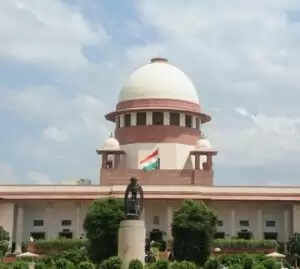Supreme Court Questions Centre on Muslim Participation in Hindu Trusts Amid Waqf Act Controversy
Supreme Court's Inquiry into Waqf Act

New Delhi: On Wednesday, the Supreme Court raised questions regarding the inclusion of Muslims in Hindu religious trusts while hearing petitions that challenge the constitutional validity of the Waqf (Amendment) Act, 2025.
A panel consisting of Chief Justice Sanjiv Khanna and Justices Sanjay Kumar and K V Viswanathan queried Solicitor General Tushar Mehta, representing the Centre, about the implications of disallowing 'waqf by user', noting that many individuals may lack the necessary documentation to register such waqfs.
'Waqf by user' pertains to properties recognized as religious or charitable endowments based on their long-term use for such purposes, even without a formal declaration from the owner.
The bench expressed concerns, stating, 'How will you register such waqfs by the user? What documents will they have? While there may be some misuse, there are also genuine cases. I have reviewed Privy Council judgments that recognize waqf by user. If you eliminate it, it could create significant issues. Legislation cannot simply void a judgment or decree; it can only take the basis into account.'
Mehta argued that a significant number of Muslims prefer not to be governed by the Waqf Act.
The bench then pressed Mehta, asking, 'Are you suggesting that Muslims will now be allowed to join Hindu endowment boards? Please state it clearly.'
The Supreme Court emphasized that a public trust established as a waqf centuries ago cannot be retroactively altered by the waqf board.
'You cannot rewrite history,' the bench remarked.
Mehta noted that a joint parliamentary committee had conducted 38 sessions and reviewed 98.2 lakh memorandums before the Act was passed by both houses of Parliament.
CJI Khanna suggested that one high court could be designated to handle the petitions.
'We want both sides to address two key points: whether we should hear this case or refer it to the High Court, and briefly outline what you wish to argue. We are not implying that there is any restriction on the Supreme Court's ability to hear and decide cases against the law,' the CJI stated.
Senior advocate Kapil Sibal, representing the petitioners, challenged the Waqf Amendment Act, questioning the provision that restricts waqf creation to Muslims only.
'How can the state determine my Muslim identity and eligibility to create a waqf?' Sibal inquired.
He further argued, 'How can the government stipulate that only those who have practiced Islam for the last five years can establish a waqf?'
Senior advocate Abhishek Singhvi, representing some petitioners, contended that the Waqf Act would have nationwide implications and should not be referred to the high court.
Senior advocate Huzefa Ahmadi, opposing the Waqf Act, asserted that waqf by user is a well-established Islamic practice that cannot be revoked.
The Centre recently enacted the Waqf (Amendment) Act, 2025, which received President Droupadi Murmu's assent on April 5 after intense debates in Parliament.
The bill was approved in the Rajya Sabha with 128 votes in favor and 95 against, while the Lok Sabha passed it with 288 supporting and 232 opposing votes.
Approximately 72 petitions, including those from AIMIM leader Asaduddin Owaisi, the All India Muslim Personal Law Board (AIMPLB), Jamiat Ulama-i-Hind, the Dravida Munnetra Kazhagam (DMK), and Congress MPs Imran Pratapgarhi and Mohammad Jawed, have been filed challenging the Act's validity.
On April 8, the Centre filed a caveat in the Supreme Court, requesting a hearing before any orders are issued regarding the matter.
A caveat is a legal notice filed to ensure that no orders are made without hearing the party that filed it.
